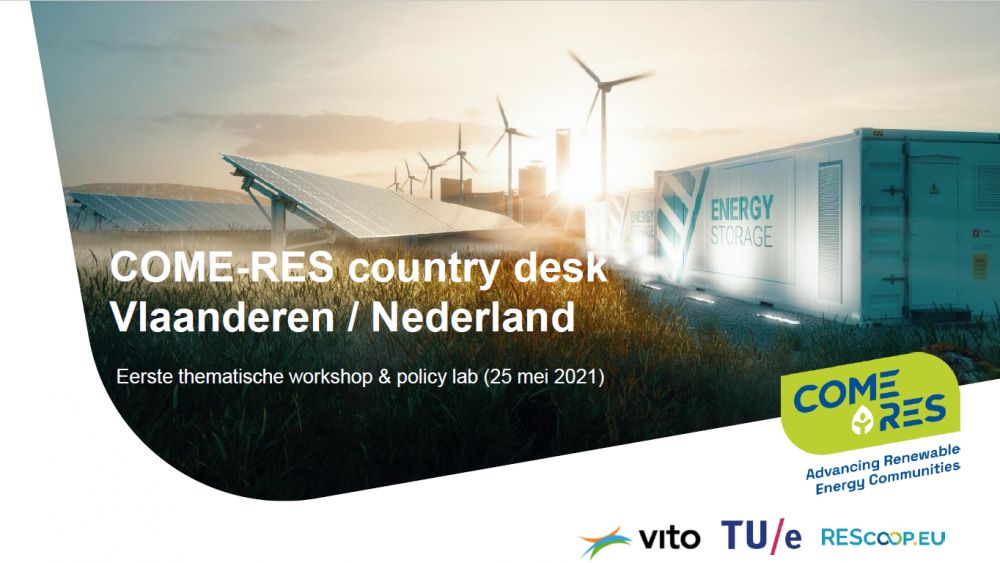First Thematic Workshop & Policy Lab held jointly for Belgian and Dutch Stakeholders
07 Jun 21
The first Thematic Workshop and Policy Lab of the Belgian and Dutch Stakeholder Desks took place online on the 25th of May 2021 and was a joint initiative of VITO/Energyville, TUEindhoven and RESCOOP.eu. More than 35 stakeholders from 26 different organizations discussed the interaction between local policy and energy communities: how can local policy stimulate the start-up and further growth of energy communities, and vice versa, how can energy communities contribute to the realization of local policy objectives? We welcomed representatives from local and national authorities, intermunicipal organizations, energy cooperatives, transition thinkers, project developers, grid operators and research institutions/agencies.
The workshop started with a brief overview of the objectives and activities of the COME RES project by Erika Meynaerts (VITO/EnergyVille). Next, four speakers gave their vision on the interaction between local policy and energy communities, each from their own context and perspective.
Hilde Hacour, policy officer Climate within the Environment Department of the Province of Flemish Brabant, explained the project "LICHT Vlaams-Brabant" that brings citizens together around collective sustainable energy projects through smart participation guidance, in order to accelerate the energy transition in their neighbourhood. The financing of these energy projects is done through direct citizen participation. She also presented the Interreg project RHEDCOOP that develops practical and financial models to facilitate energy renovations and renewable energy production, both in public buildings and private homes. The models are developed for energy (citizens') cooperatives in the Netherlands and Flanders and incorporate a practical and financial relief for the target groups involved.
Leo D'haese, director of the renewable energy cooperative ECOoB and the non-profit organisation Minder=meer, illustrated how citizen participation and public-private partnerships accelerated the climate transition in East-Brabant and how the government can further support citizen cooperatives.
Martijn Messing, project manager of the Social Innovation Programme of the Province of Brabant/Enpuls, illustrated how local energy communities can contribute to the energy transition (through stimulating, exploiting and connecting) and also made some critical reflections about the future development of local energy communities and the role that authorities play in this.
Rien de Bont, Master's student from TUEindhoven, presented different views on the stimulation of energy communities in the Dutch context of multi-level governance that are also the subject of his master's thesis.
The presentations were followed by a panel debate, moderated by Erik Laes (TUEindhoven). During the presentations, participants could send their questions to the speakers via the chat. These questions were compiled and presented to the speakers:
The transition to a renewable energy system needs to be radically accelerated. Does this also imply that energy communities have to professionalize?
Energy communities must ensure that they continue to defend the interests of the whole community. What alliances should they form with local policies (which rely on mechanisms of representative democracy)?
Is the way in which energy communities are anchored in national legislation sufficiently transparent? And if not, how can this be made more transparent?
In the policy lab, the participants were divided into two groups. In each group, four propositions were discussed with the participants in an interactive way:
To what extent should local authorities (e.g. municipality, province, RES region) facilitate energy communities?
Assume that a local government can only support one energy community. Which criterion is then decisive in making a choice?
How can local authorities ensure that energy communities have the broadest possible support?
What type of energy community should local authorities (e.g. municipality, province, RES region) stimulate in particular?
The workshop and policy lab was closed by Erika Meynaerts (VITO/Energyville). The next Country Desk activity will take place in November/December 2021 and will aim to present the progress of the COME RES project to stakeholders and to validate some project results.
All news
